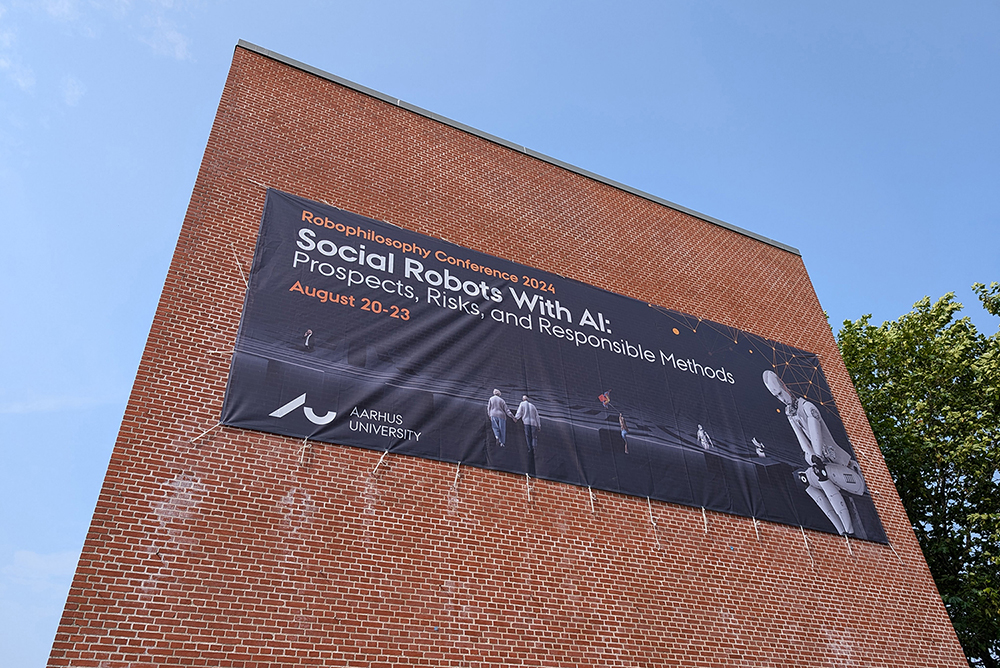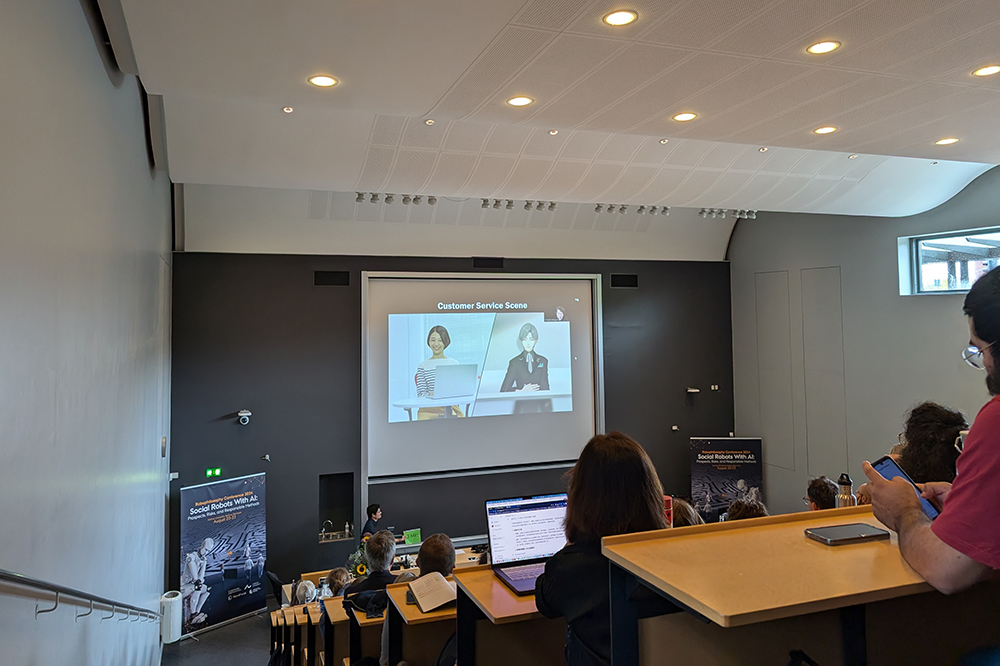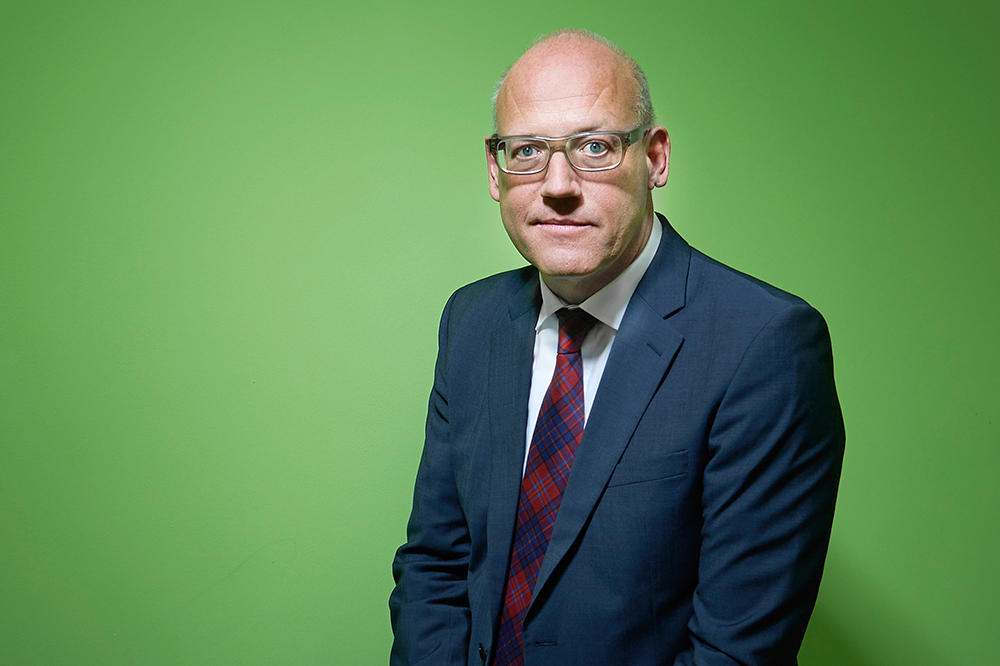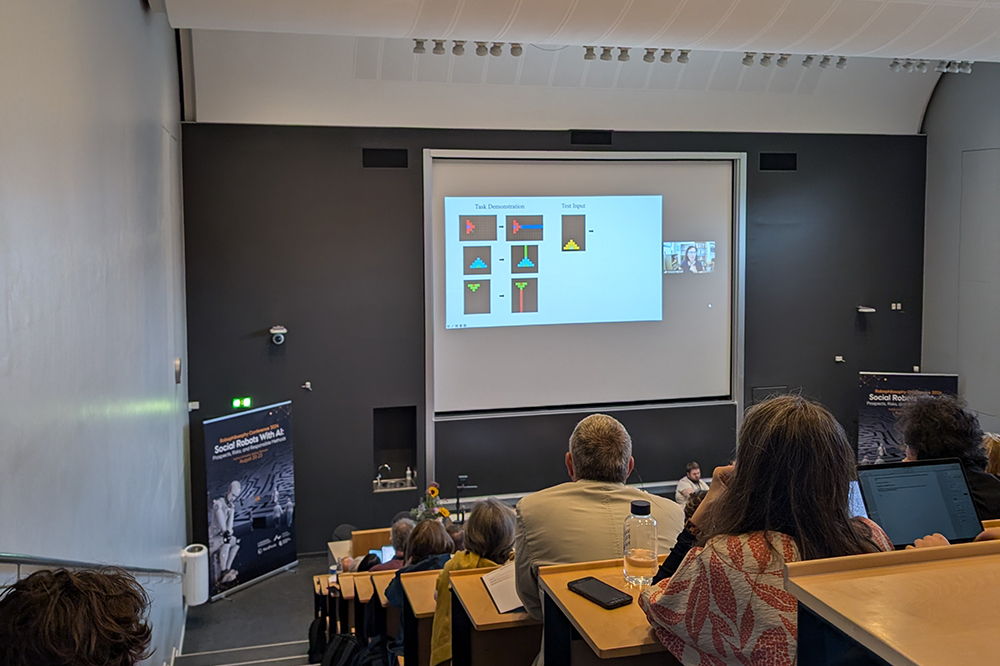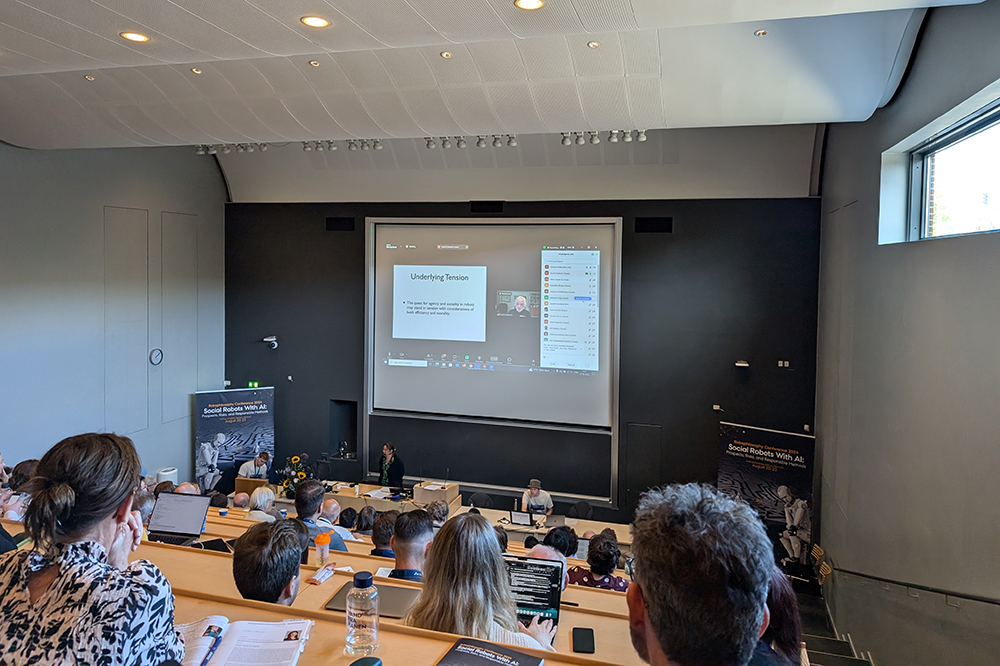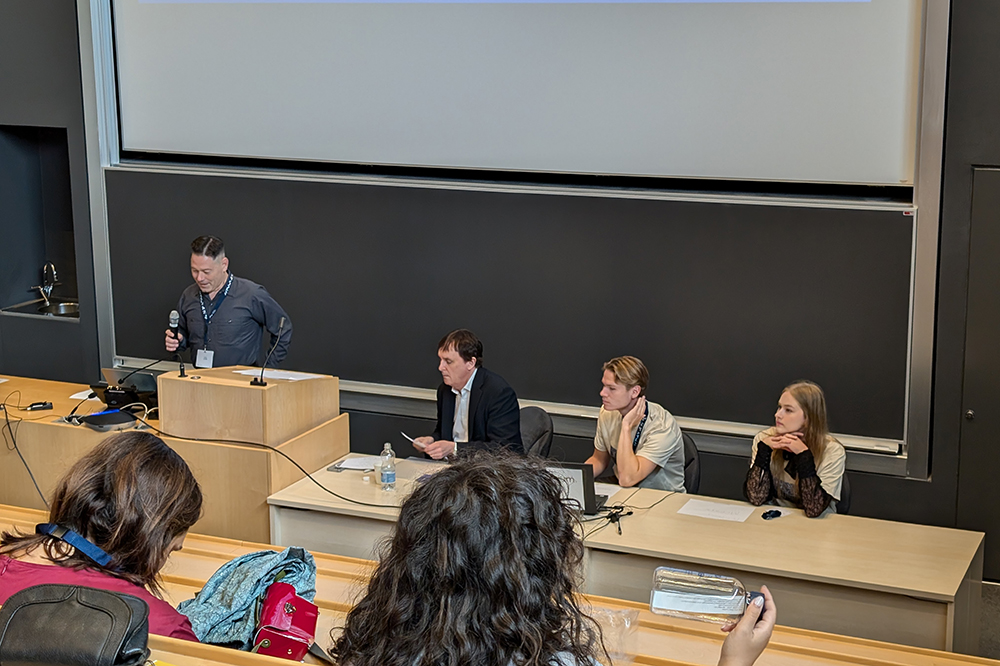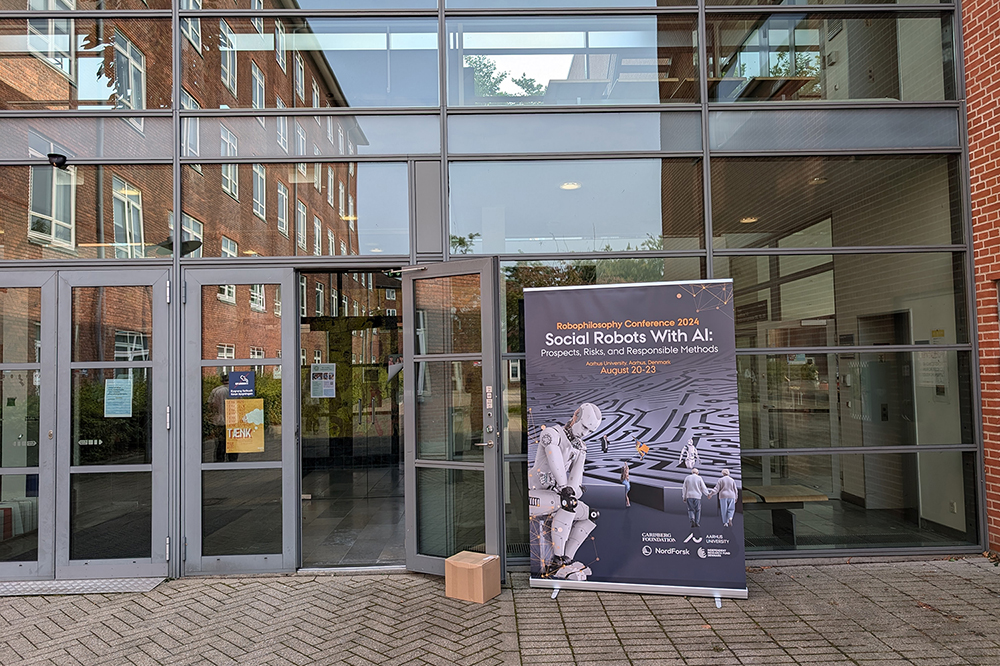The paper “Robots at arm’s length: Unveiling the dynamics of interpersonal distance preferences in human-robot interactions” by Katharina Kühne, Laura M. Zimmer, Melina Jeglinski-Mende, Oliver Bendel, Yuefang Zhou, and Martin H. Fischer was published in February 2025 in the proceedings volume “Social Robots with AI: Prospects, Risks, and Responsible Methods” … From the abstract: “In social interactions, interpersonal distance is a vital factor influencing relationships, providing protection, and regulating arousal. Despite the intuitive nature of adopting specific distances, little is known about comfortable interpersonal distances with social robots. In our online study with 66 participants using a Go/No-Go task, we investigated perceptions of individuals standing face-to-face with a robot at different distances. In line with the negativity bias hypothesis, participants exhibited a preference for greater distances , as reflected in longer reaction times. Furthermore, the human-likeness of the robots moderated the link between distance and arousal. Finally, the most human-like robot was less liked and evoked higher arousal. These findings have implications for designing social robots and optimizing interactions, particularly in educational or medical contexts.” The proceedings volume comprises the papers presented at Robophilosophy 2024 in Aarhus. Leading philosophers, computer scientists, and roboticists met there in August. Like the ICSR, the conference is one of the world’s leading conferences on social robotics.
A New Paper on Universal Robots
The paper “The Universal Robot of the 21st Century” by Oliver Bendel was published in February 2025 in the proceedings volume “Social Robots with AI: Prospects, Risks, and Responsible Methods” … From the abstract: “Developments in several areas of computer science, robotics, and social robotics make it seem likely that a universal robot will be available in the foreseeable future. Large language models for communication, perception, and control play a central role in this. This article briefly outlines the developments in the various areas and uses them to create the overall image of the universal robot. It then discusses the associated challenges from an ethical and social science perspective. It can be said that the universal robot will bring with it new possibilities and will perhaps be one of the most powerful human tools in physical space. At the same time, numerous problems are foreseeable, individual, social, and ecological.” The proceedings volume comprises the papers presented at Robophilosophy 2024 in Aarhus. Leading philosophers, computer scientists and roboticists met there in August. Like the ICSR, the conference is one of the world’s leading conferences on social robotics (Photo: Katharina Kühne).
Closing Event of a Successful Conference
Robophilosophy 2024 took place for three and a half days in Aarhus (Denmark). It is a biennial dedicated to social robotics. Alongside the ICSR, it is the most important conference in this field. The program was again very extensive. Workshops were held and presentations given in four different tracks. There were keynotes and plenary sessions by well-known names, from Wendell Wallach to Hiroshi Ishiguro. After a sunny start, it began to rain, which made it all the easier to concentrate on the scientific exchange. In the end, the sun came out again in time for the closing event. Johanna Seibt, the brains behind Robophilosophy, received a bouquet of flowers and a standing ovation. The experts will meet again in two years’ time. Where has not yet been decided. A few potential hosts spoke up. Edinburgh would be an option, but so would California.
Talk by Hiroshi Ishiguro
On the fourth day of Robophilosophy 2024, Hiroshi Ishiguro, Professor at the Department of Systems Innovation in the Graduate School of Engineering Science at Osaka University, gave a talk entitled “AI Avatars and the Future Society”. From the abstract: “In this lecture, the presenter will report on the research and development of remotely operated robots and CG agents, also known as avatars. Avatar technology has advanced significantly in recent years, thanks to progress in AI technology. We will discuss the various services that can be deployed using avatars and the kind of society we can realize as a result.” (Website Robophilosophy 2024) After the lecture, the roboticist was questioned by Raja Chatila, Sorbonne University (France), and Mihaela Constantinescu, Faculty of Philosophy, University of Bucharest (Romania). Hiroshi Ishiguro had been a regular guest at Robophilosophy. In 2018, he appeared on site in Vienna.
Talk on Universal Robots
On the fourth day of Robophilosophy 2024, Oliver Bendel, Professor at the FHNW School of Business, gave a talk entitled “The Universal Robot of the 21st Century”. From the abstract: “Developments in several areas of computer science, robotics, and social robotics make it seem likely that a universal robot will be available for the mass market in the foreseeable future. Large language models for communication, perception, and control play a central role in this. This article briefly outlines the developments in the various areas and uses them to create the overall image of the universal robot. It then discusses the associated challenges from an ethical and social science perspective. It can be said that the universal robot will bring with it new possibilities and will perhaps be one of the most powerful human tools in physical space. At the same time, numerous problems are foreseeable, individual, social, and ecological.” (Website Robophilosophy 2024) This was followed by an intensive plenary discussion on the design and usefulness of universal robots. In an individual discussion, Oliver Bendel suggested designing universal robots like early humans or apes. They can move on all fours, but can also stand up on two legs if the situation requires it. This would at least solve some of the safety problems posed by bipeds.
The Rainbow Above the Museum
The Robophilosophy community consists of philosophers, psychologists, roboticists, and representatives of other disciplines. It is a tradition for everyone to come together for a social event to get new inspiration and chat about their work and motivation in an informal atmosphere. This time, they attended a robot performance in the theater on the second day. On the third day, the conference dinner was held together in the rooftop restaurant of the AROS Art Museum. One of the highlights was the tour of the ninth floor. The Danish-Icelandic artist Olafur Eliasson has created Your rainbow panorama which was officially opened in May 2011. You can see Aarhus with its church towers, residential buildings, streets, and people through the colorful panes. Afterwards, the tireless went out into the city’s nightlife.
Keynote by Melanie Mitchell
On the third day of Robophilosophy 2024, Melanie Mitchell, Professor at the Santa Fe Institute (USA), gave a keynote speech entitled “AI’s Challenge to Understanding the World”. From the abstract: “I will survey a debate in the artificial intelligence (AI) research community on the extent to which current AI systems can be said to “understand” language and the physical and social situations language encodes. I will describe arguments that have been made for and against such understanding, hypothesize about what humanlike understanding entails, and discuss what methods can be used to fairly evaluate understanding and intelligence in AI systems.” (Website Robophilosophy 2024) In this keynote – as in previous keynotes and presentations – the restrictions of AI and generative AI were emphasized. In response to a question from an audience member, the potential was also acknowledged.
Keynote by David Chalmers
On the second day of Robophilosophy 2024, David Chalmers, an Australian philosopher and cognitive scientist, gave a keynote speech entitled “Does Generative AI Extend the Mind?”. From the website: “Prof. Chalmers is known worldwide, also outside of philosophy, for his contributions to consciousness research in ‘The Character of Consciousness’ (2010), and in particular for identifying more clearly than anyone the tasks for a philosophical account of consciousness (‘the hard problem’ of consciousness). Since recent advances in AI bring Chalmers’ thought experiment of ‘philosophical zombies’ closer to reality, in his current research he combines philosophy and a longstanding interest in AI for the exploration of the status of virtual reality … and the likelihood of creating artificial systems that fulfil the criteria of consciousness.” (Website Robophilosophy 2024) A key statement was: “As social AI systems become increasingly agent-like, they will decreasingly extend the mind …” The final statement was: “The quest for agency and sociality in robotsmay stand in tension with considerations of both efficiency and morality.” The audience applauded the witty and humorous talk.
Keynote by Anthony Elliott
On the second day of Robophilosophy 2024, Anthony Elliott, Distinguished Professor of Sociology at the University of South Australia, gave a keynote speech entitled “May AI Be With You: Agency and Automation in the Age of Algorithmic Modernity”. From the abstract: “From industrial robots to ChatGPT, and from driverless cars to military drones: AI is transforming all aspects of our lives, from the changing nature of work, employment and unemployment to the most intimate aspects of personal relationships. In this presentation, Anthony Elliott focuses on the complex systems of AI – spanning intelligent machines, chatbots, advanced robotics, accelerating automation, big data – and their centrality to new forms of social interaction, organizational life and governance. He argues, provocatively, that today modernity has come to mean smartphones, tablets, cloud computing, big data, automated recommendation systems and predictive analytics. This has heralded the arrival of what he terms ‘algorithmic modernity’, an altogether new ‘stage’ in the ordering techniques of envisioned human mastery. In this automated order of algorithmic modernity, human agency is increasingly outsourced to smart machines. We should understand this phenomenon, Elliott argues, in terms of a containment of both uncertainty and complexity which the digital revolution in social relations poses, but which ultimately denies answers.” (Website Robophilosophy 2024) In his presentation, the sociologist emphasised the risks of AI rather than the opportunities. The photo shows David Gunkel announcing Anthony Elliott’s lecture – he is sitting on the far left.
Start of Robophilosophy 2024
On August 20, 2024, Robophilosophy 2024 was opened with words of welcome from Maja Horst, Dean of the Faculty of Arts at Aarhus University, and Johanna Seibt, Professor of the School of Culture and Society at Aarhus University. The website says: “The international research conference RP2024 will discuss the questions that really matter in view of the new technological potential of social robotics. In over 100 research talks, RP2024 will address concrete and deep issues that reach far beyond safety and privacy concerns into the conceptual and normative fabric of our societies and individual self-comprehension.” (Website Robophilosophy 2024) The first keynote on the first day of the conference was given by Wendell Wallach, one of the world’s best-known machine ethicists. With his book “Moral Machines” (2009), he laid the foundation for a discipline that has been developing in science fiction and science for years and decades. This was followed in 2011 by “Machine Ethics” by Michael Anderson and Susan L.eigh Anderson. In addition to machine ethics, Robophilosophy is dedicated to robot ethics and other interesting perspectives on social robots.


